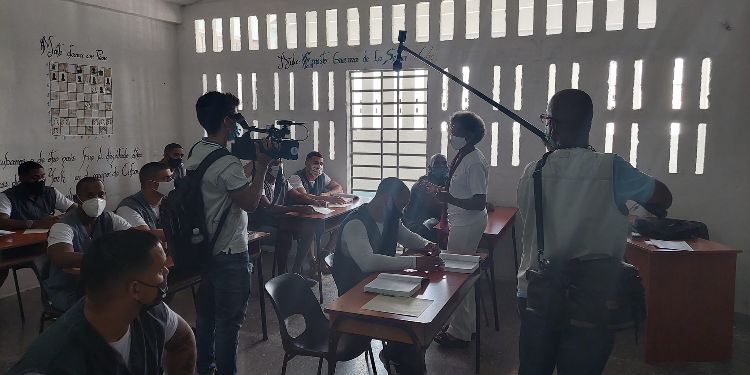MEXICO CITY. – For 33 years, the International Red Cross has not been able to visit Cuban prisons. the last time you did, in November 1989, requested to see all those imprisoned, but the dictatorship did not grant that request. In 2013, the Island Government announced that it would allow UN rapporteurs on torture to visit prisons, but the promise did not materialize: access to prisons continues to be closed to international organizations, human rights organizations international human rights and independent civil society in Cuba. The Cuban government has been a state party to the “Convention against torture, cruel and degrading treatment” since 2009, but does not allow monitoring in its prisons.
This position is a fact reiterated by all dictatorships; the problem is that the systematic violation of the rights of all inmates -particularly those of political prisoners- condemns thousands of people to a slow death, in absolute helplessness. In the case of Cuba, this arbitrariness has been evident for six decades.
Currently, the Island has the largest number of political prisoners in the world. Other countries like Iran, Belarus, Venezuela and Nicaraguaidentified among the most violators of human rights, have counted fewer political prisoners.
Several international human rights organizations, such as Amnesty International, the Cuban Human Rights Observatory and Prisoners Defenders, have denounced the number of political prisoners in Cuba that increases every year, especially after the July 11, 2021. Prisoners Defenders counts in your most recent report (September this year) 1,026 political prisoners, 36 of them minors.
Thanks to internet access on mobile phones since December 2018, it has been possible to more clearly and directly specify the number of human rights violations in Cuban prisons, even despite the dictatorship’s prohibition to access them. More than 100 prisoners have given their direct testimonies to the organization Prisoners Defenders, while social networks are filled daily with the testimony of relatives of prisoners.
They denounce unsanitary conditions, lack of drinking water, lack of medical assistance, food in poor condition and precarious, prohibition to go out in the sun every day, theft of food by the authorities, ill-treatment, incommunicado for months, humiliation, prison cells, punishment and torture. Reviewing the official page of the Cuban Government in the Human Rights Council, it is clear that the dictatorship has never recognized the existence of political prisoners. The regime has been denying their existence for six decades.
In the most recent Universal Periodic Evaluations of Cuba at the UN (2009, 2013 and 2018), the island’s regime has been evaluated and condemned for all the violations of the rights of inmates. The UN Committee of Rapporteurs on Torture and Ill-treatment and Degradation has repeatedly pointed out to Havana the patterns of rights violations against inmates.
No country can be excluded from the permanent visits of the United Nations rapporteurs, an international legal procedure adopted by 128 UN members. Nor can any State prevent the visit of international human rights organizations such as Amnesty International or the International Red Cross, among others. On repeated occasions, the Cuban government He has said that he speaks with the International Red Crossbut does not allow you to inspect jails.
The Cuban dictatorship, which has hijacked the mass media for six decades, does not inform citizens of the hundreds of accusations made by the United Nations about the systematic violation of civil and political rights; neither of the accusations about the repeated violations and the repressive patterns that it uses against political prisoners and common prisoners.
The Penitentiary Regulations in force in Cuba fail to comply with all the UN Mandela Rules. These are its most visible features:
-There is no authority independent of the PCC that can access the inspection of prisons: neither independent civil society, nor international organizations. Only institutions created and controlled by the PCC can access.
-The regime does not specify the temporality of each right, allowing each prison authority to discretionally or arbitrarily violate the rights of inmates. For example, communication with their families, going out into the sun daily, medical care or access to natural light in the cells. Also, the dictatorship sentences political prisoners to punishment cells whose rights are not respected. You can not protest the subhuman conditions suffered by prisoners: those who protest are beaten and punished, while the jailers go unpunished.
-The bias towards political prisoners facilitates the abuse of power by the authorities against them, with impunity. In six decades there is not a single abuse of power by prison authorities that has gone to court and been convicted. Thus, thousands of innocent prisoners languish in Cuban prisons. Defense lawyers cannot face impunity from prison authorities, prosecutors, judges and courts. In short, they cannot exercise their profession.
The Cuban prison system behaves like a closed, opaque corporation, where arbitrariness and the discretion of the authorities reign without the right to reply. Every day we know in the networks the impunity of common inmates oriented to attack political prisoners in exchange for some benefit; or we have news of the role of the prison authorities themselves, maximum violators of the rights of inmates.
Will the international community leave us like this? The Cuban dictatorship must be demanded to open all prisons for international inspection in accordance with the Minimum Rules or Mandela Rules of the UN. Until now, in six decades there have only been brief “directed visits”, one or two, of some foreign journalists to prisons selected by the dictatorship; “directed visits” that hide the violations of the inmates’ rights and present an idyllic situation of the prison system in Cuba.
OPINION ARTICLE
The opinions expressed in this article are the sole responsibility of the issuer and do not necessarily represent the opinion of CubaNet.
Receive information from CubaNet on your cell phone through WhatsApp. Send us a message with the word “CUBA” on the phone +525545038831, You can also subscribe to our electronic newsletter by giving click here.















